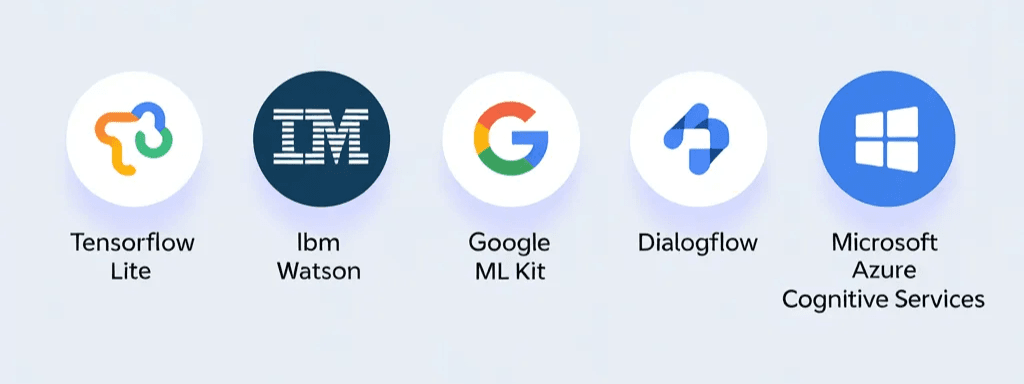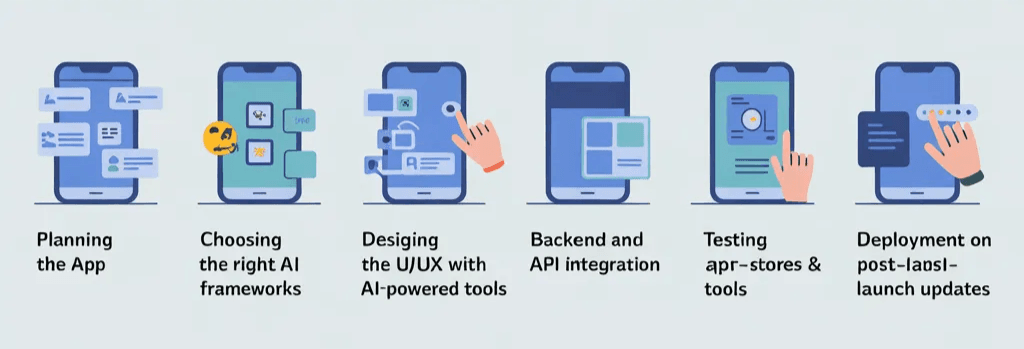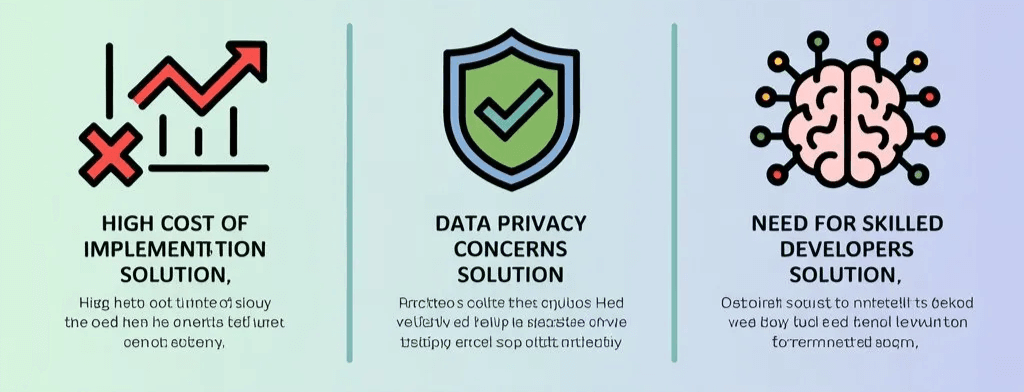# AI Mobile App Development 2025: The Ultimate Guide to Trendy Tools
Published: 2025-09-12
Last Updated: 2025-09-12
Think back to the apps of a few years ago. They followed a rigid set of rules, offering the same experience to every user. Now, the digital world is defined by applications that can anticipate your needs, personalize content, and even hold conversations. This shift is powered by one key technology: **Artificial Intelligence**. Modern apps are no longer static tools; they are dynamic, intelligent platforms that learn and adapt in real time.
The adoption of AI-enabled applications has reached a massive scale. According to a recent report, [close to **700 million people**](https://www.notion.so/1c828eac4f2f811c8e67d3e301de2faf?pvs=21) used AI-powered apps regularly in the first half of 2025. These apps represent a significant evolution, as they are designed to analyze usage patterns and adapt fluidly in real time. Their capabilities include instantaneous responses to queries, visual and voice recognition, and the personalization of content based on individual preferences. This shift from static tools to intelligent platforms is redefining the user experience.✨
# What is AI Mobile App Development?
[AI mobile app development](https://visionx.io/blog/ai-in-mobile-app-development/) is the process of integrating artificial intelligence into mobile applications to improve their functionality and user experience. It brings in features like personalized recommendations, predictive analytics, and conversational chatbots that make apps more helpful and intuitive. For developers, AI also streamlines the creation process by assisting with everything from code generation to bug detection.
The core purpose of AI in mobile app development is to help apps understand human behavior and learn about user needs so they can respond in a way that feels personal. An AI-enabled app can instantly translate languages, recommend music you might want to listen to, or help you shop by recognizing an item in a photo.
# How AI Works in Mobile Applications⚙️
You interact with AI in your favorite apps every day. For instance, services like Netflix and Spotify use AI to analyze your viewing and listening history, suggesting new shows or songs you're likely to enjoy. Virtual assistants like Siri and Google Assistant leverage AI's natural language processing to understand your voice commands and complete tasks. Even your phone's camera uses AI to automatically adjust settings and recognize faces, ensuring you get the perfect shot.
The technology behind these features relies on a few core components:
- **Machine Learning (ML):** This helps apps learn from data so they can make better predictions and decisions over time.
- **Natural Language Processing (NLP):** This allows apps to understand and respond to human speech or text.
- **Computer Vision:** This enables apps to identify and process images or videos.
Today, businesses of all sizes can integrate AI into their mobile app development process to add powerful features that boost user engagement and expand their user base.
# Best AI Tools for Mobile App Development

Navigating the world of **AI tools for app development** can be overwhelming. Here are some of the best platforms to get you started:
- **TensorFlow Lite:** A lightweight version of [TensorFlow](https://www.tensorflow.org/api_docs/python/tf/lite) designed to run machine learning models directly on mobile devices, enabling fast, offline AI capabilities.⚡️
- **IBM Watson:** A suite of enterprise-ready [AI services](https://www.ibm.com/watson), including natural language processing and visual recognition, that can be integrated into apps via APIs.🤖
- **Google ML Kit:** Google [ML Kit](https://developers.google.com/ml-kit) is a mobile SDK that offers pre-trained models for common use cases like text recognition, face detection, and barcode scanning, making it easy to add AI features to both iOS and Android apps.✍️
- **Dialogflow:** It is a Google-owned [platform](https://dialogflow.cloud.google.com/#/login) for building conversational interfaces like chatbots and voice assistants that understand natural human language.🗣️💬
- **Microsoft Azure Cognitive Services:** A comprehensive family of AI [services](https://azure.microsoft.com/en-us/products/ai-services) and APIs that developers can use to build intelligent apps with capabilities like vision, speech, and language understanding.👀👂🗣️
# Your Step-by-Step Guide to Building an AI-Powered App
Creating an AI app involves a structured process. Let's break down the development lifecycle from idea to launch.

## Step 1: Planning the App✍️
Before writing any code, you need a solid plan. Start by validating your idea: does it solve a real problem for users? Define your **target audience** and outline the core features. For an [AI app](https://aistudio.google.com/welcome?utm_source=google&utm_medium=cpc&utm_campaign=FY25-global-DR-gsem-SKWS-1710442&utm_content=text-ad-none-any-DEV_c-CRE_736763400929-ADGP_Hybrid%20%7C%20SKWS%20-%20EXA%20%7C%20Txt-Development%20(Growth)-Program%20AI%20App-KWID_43700081658610577-kwd-2312217506606&utm_term=KW_program%20ai%20app-ST_program%20ai%20app&gclsrc=aw.ds&gad_source=1&gad_campaignid=22307833850&gbraid=0AAAAACn9t67WbfafykatJRbQ1ECqcfbsz&gclid=CjwKCAjwlOrFBhBaEiwAw4bYDSFsxhfFt_lCAx-Nsz1kmZYUigMI1OnjGP5qx83vlQZ6XRB6cuSSdhoConIQAvD_BwE), it’s crucial to specify what tasks the AI will perform, such as personalizing content, recognizing images, or powering a [chatbot](https://www.chatbot.com/).
## Step 2: Choosing the Right AI Frameworks🎯
The right framework is the foundation of your app. Your choice will depend on your project's complexity and platform. Popular options include:
- **TensorFlow:** An open-source library perfect for complex machine learning models.
- **PyTorch:** Known for its flexibility and ease of use, especially in research and prototyping.
- **Core ML:** Apple’s native framework for seamless AI integration on iOS devices.
## Step 3: Designing the UI/UX with AI-Powered Tools 🎨
A great user interface (UI) and user experience (UX) are vital. AI can even help here! Tools can analyze user behavior to suggest optimal layouts or generate design elements, ensuring your app is not only smart but also beautiful and easy to navigate. The goal is to make the AI features feel like a natural part of the app, not a gimmick.
## Step 4: Backend and API Integration⚙️
Your app's backend is the engine that powers everything. This is where your AI model will likely live, either on-device or in the cloud. You'll need to build or integrate robust APIs (Application Programming Interfaces) to allow the front-end of your app to communicate with the AI model and process data efficiently.
## Step 5: Testing with AI-Driven Tools🐞
Testing an AI app is more complex than a standard app. You need to verify both the app's functionality and the AI model's accuracy. [**AI-driven testing tools**](https://www.atlassian.com/software/jira/service-management?campaign=20339374780&adgroup=152515832804&targetid=kwd-567601431343&matchtype=b&network=g&device=c&device_model=&creative=672185076636&keyword=service%20desk%20automation%20tools&placement=&target=&ds_eid=700000001721198&ds_e1=GOOGLE&gad_source=1&gad_campaignid=20339374780&gbraid=0AAAAADAVAKfDNzTadl7uZQWMqbMsgvWVQ&gclid=CjwKCAjwlOrFBhBaEiwAw4bYDTtwda6WYLmYOGL922IWrwxxb1QxJ1HcyxmEm-UAdqeXJ65xwAub1RoCV4MQAvD_BwE) can automate this process by simulating user interactions, finding bugs faster, and ensuring the AI performs as expected under various conditions.
## Step 6: Deployment on App Stores🚀
Once your app is thoroughly tested and polished, it’s time to deploy it on the [Google Play Store](https://play.google.com/store/apps?hl=en&pli=1) and [Apple App Store](https://www.apple.com/app-store/). This involves preparing your app listings, including descriptions, screenshots, and privacy policies, especially important for **AI mobile apps** that handle user data.
## Step 7: Post-Launch Updates and Maintenance🔧
The journey doesn’t end at launch. [AI models](https://www.ibm.com/think/topics/ai-model) need to be continuously monitored and updated with new data to improve their accuracy. Collect user feedback and analyze performance metrics to roll out updates that make your app smarter and more reliable over time.
# Benefits of AI in Mobile Apps✨
Integrating **artificial intelligence apps** brings immense value.

- **Personalized User Experience:** AI algorithms analyze user behavior to offer custom content, recommendations, and notifications. 🎁
- **Predictive Analytics:** Businesses can forecast user trends and make data-driven decisions to improve engagement. 🔮
- **Voice and Image Recognition:** Features like voice commands, visual search, and facial recognition create more interactive and accessible apps.🗣️📸
- **Improved Security:** AI can detect fraudulent activities and security threats in real-time, protecting both the user and the business. 🛡️
# Challenges & How to Overcome Them

While AI is powerful, it comes with challenges. Here’s how to tackle them:💪
- **High Cost of Implementation Solution:** Start with [pre-trained models](https://www.kaggle.com/models) from platforms like [Google ML Kit](https://developers.google.com/ml-kit) or use [scalable cloud services](https://aws.amazon.com/free/?all-free-tier.sort-by=item.additionalFields.SortRank&all-free-tier.sort-order=asc&awsf.Free%20Tier%20Types=*all&awsf.Free%20Tier%20Categories=categories%23compute&trk=d0614f14-fffb-4657-882e-a102052330fa&sc_channel=ps&ef_id=CjwKCAjwlOrFBhBaEiwAw4bYDaz4MOc2YYx7EwcUbLG6AGV9IybTWKUmHsI8VQ_ugu2wr8ckQZ6BVBoCg1UQAvD_BwE:G:s&s_kwcid=AL!4422!3!770357384064!p!!g!!server%20and%20cloud!22912999080!190996489864&gad_campaignid=22912999080&gbraid=0AAAAADjHtp868K3vxBQ7in5Lqn5F1duZI&gclid=CjwKCAjwlOrFBhBaEiwAw4bYDaz4MOc2YYx7EwcUbLG6AGV9IybTWKUmHsI8VQ_ugu2wr8ckQZ6BVBoCg1UQAvD_BwE) to avoid massive upfront hardware costs. 💰
- **Data Privacy Concerns Solution:** Be transparent with users about what data you collect and how it's used. Comply with regulations like [GDPR](https://gdpr-info.eu/) and prioritize on-device processing to keep sensitive data secure. 🔒
- **Need for Skilled Developers** **Solution:** Invest in training your existing team or partner with specialized **AI app development** agencies. The rise of low-code AI platforms is also making the technology more accessible.👩💻
# How Can Devkind Help You Build a Custom AI Development? 🚀
At [Devkind](https://devkind.com.au/), we don’t just develop we create intelligent digital solutions powered by AI to help your business grow smarter and faster. Here’s what we provide:
- **Strategic Discovery:** We begin by understanding your business goals and challenges to design an AI solution that truly fits your needs. 🧭
- **Agno-Powered Customisation:** From automation to predictive insights, we tailor AI features using the [Agno](https://devkind.com.au/sub-service/agno-development) ecosystem for maximum adaptability and performance. 🎯
- **Collaborative Development:** We work with you at every stage from concept and design to development and testing ensuring the final app matches your vision.🤝
- **Scalable Architecture:** Our apps are built to scale, handling growth seamlessly while maintaining high performance.📈
- **Intuitive User Experience:** We transform complex AI interactions into simple, easy-to-use interfaces that your users will love.🥰
- **Enterprise-Grade Security:** With strong security and compliance protocols, we keep your data safe and reliable.🛡️
- **Continuous Support & Evolution:** Post-launch, we provide ongoing updates, monitoring, and refinements so your AI app stays ahead of the curve.🔄
# Conclusion
Building AI-powered mobile apps in 2025 is more accessible than ever, thanks to powerful frameworks like TensorFlow Lite, Core ML, and comprehensive platforms that handle the heavy lifting. The key is choosing the right combination of technologies that match your app's needs, setting up a solid development environment, and focusing on user experience from day one. Remember that successful AI apps aren't just about impressive algorithms they're about solving real problems for users in ways that feel natural and intuitive.💡
Don't get overwhelmed by all the options available. Start with a clear vision of what you want your app to accomplish, then build incrementally. Test your AI features early and often, keep performance optimization in mind throughout development, and plan your deployment strategy before you're ready to launch. The tools and frameworks covered in this guide give you everything you need to create something amazing now it's time to turn your AI app idea into reality.🚀✨